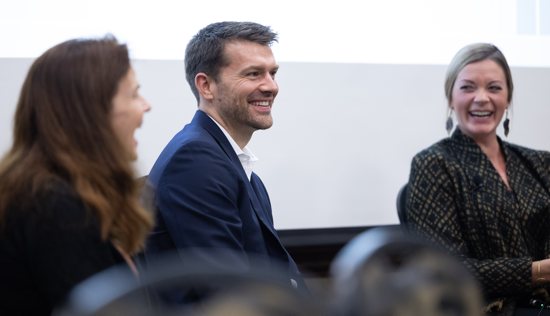
As Catholics struggle with the fact that too many young adults are leaving the faith, people gathered at a recent event sponsored by the Catholic Community Foundation of Minnesota discussed one countermeasure — intergenerational charitable giving. More specifically, philanthropy.
After spending several years addressing the issue of how to engage younger people, CCF began to explore intergenerational philanthropy as a way for young people to help bring to life the intent of their elders Inspired by the annual conference of the national FADICA Catholic Philanthropy Network in February, CCF organized a local event on the subject Sept. 26 at the University of St. Thomas in St. Paul.
Called Voices of Intergenerational Catholic Philanthropy, the CCF event featured three guest panelists and the opportunity for audience members to ask questions.. FADICA was a co-sponsor of the event, and its vice president, Alicia Bondanella Simon, gave remarks and helped lead the discussion.
“Intergenerational philanthropy and next generation engagement are critical to ensuring Catholic philanthropy and a strong, vibrant Catholic Church well into the future,” Bondanella Simon said. FADICA is working to “form and engage diverse young Catholic leaders to shape and lead the Church.”
One of the panelists, Quentin Orem, executive director of The Ferry Foundations, is himself a young adult Catholic who has had experience helping guide his family through the philanthropy process. He helps lead the foundation started by his grandparents, Richard and Maude Ferry. Rooted in Catholic tradition, the foundation works to promote the dignity and quality of life in Los Angeles and Seattle. Orem works directly with his grandfather at the foundation’s headquarters in Seattle and said he is learning “how to make decisions together and learning how to take his intent and bring it to life.”
Another panelist, Sheila Healy Berube, serves on the board of CCF and with her siblings helps manage a donor-advised fund at CCF in the Twin Cities. Her parents started the fund 30 years ago and designated its management to their children upon their deaths.
“We do view this as a huge gift, not only because it’s a chance for us to continue their legacy of giving, but (because) we’ve also learned a lot about them through this,” Healy Berube said.
The third panelist, Christy Boysen, specializes in planned giving strategy as CEO of Apex Legacy Consultants in St. Paul and works with nonprofits and donors. All three panelists said they have experienced profound moments in working with clients and working within their own families. The donors are rooted in a faith that they want to be their primary legacy.
“My first memory of my grandfather, which will forever be my primary memory of him, is him doing his back exercises and saying the rosary,” Orem said. “He has said the rosary every day of his life, or at least every day that I have been alive. … The primary thing that he prays for in his daily rosary is that the life of Christ would come alive in his family members. And , that is what he wants to pass on.”
This is one reason why the panelists recommend that people start planning their legacy as soon as they can. It makes the process intentional, they said, and it helps build relationships within families that transcend the financial. “The work of philanthropy is one of the best ways to pass on the faith,” Orem said.
As he has continued to work with his grandfather, he has seen a blending of both his and his grandfather’s values channeled into charitable giving to carry out those values.
“What he has done is really made room for me to, I think, have ownership in the future of our philanthropy and to feel like my own priorities can flourish alongside his,” Orem said. “What do young Catholic philanthropists look for? … Trust and inclusion. And, I feel trusted and included by my grandfather. And, what has that done? That has really allowed my work in the foundation to promote my faith.”
One of the ways this is made manifest is an effort to build a Marian shrine “in the heart of Seattle,” Orem said. “I love that project. And, that’s something that has only come to life in me because my grandfather made room for the unique ways that Christ is happening in me.”
This is an example of how there’s “so much room for creativity” in the charitable giving process, Boysen said. It can start by something as simple as writing a letter to family members, especially children and grandchildren.
“What are your hopes for your children, your grandchildren?” she said, suggesting questions the letter can address. “What do you want the future to look like? A huge part of generosity and philanthropy is casting a vision for what can be and then giving and creating space for your kids, your grandkids, your great grandkids to figure out what that looks like in the context of today.”
She also recommended adding a “statement of faith” to the will — “something that’s about your faith, about your heart, your passion for your family and for the world, because that invites them into the conversation,” she said. “There’s not a better time to start doing that than now.”
For her and the other panelists, it’s all about being forward-thinking when it comes to philanthropy, no matter how much or how little money a person, couple or family has to work with.
“It’s transformative, I think, for someone to go through the process of thinking about how does this work,” Boysen said. “How does generosity fit into my legacy? It changes how they do life. And, often that exuberant joy carries forward from generation to generation. And that, to me, is the point.”
For more information about this event and philanthropy, visit ccf-mn.org.



